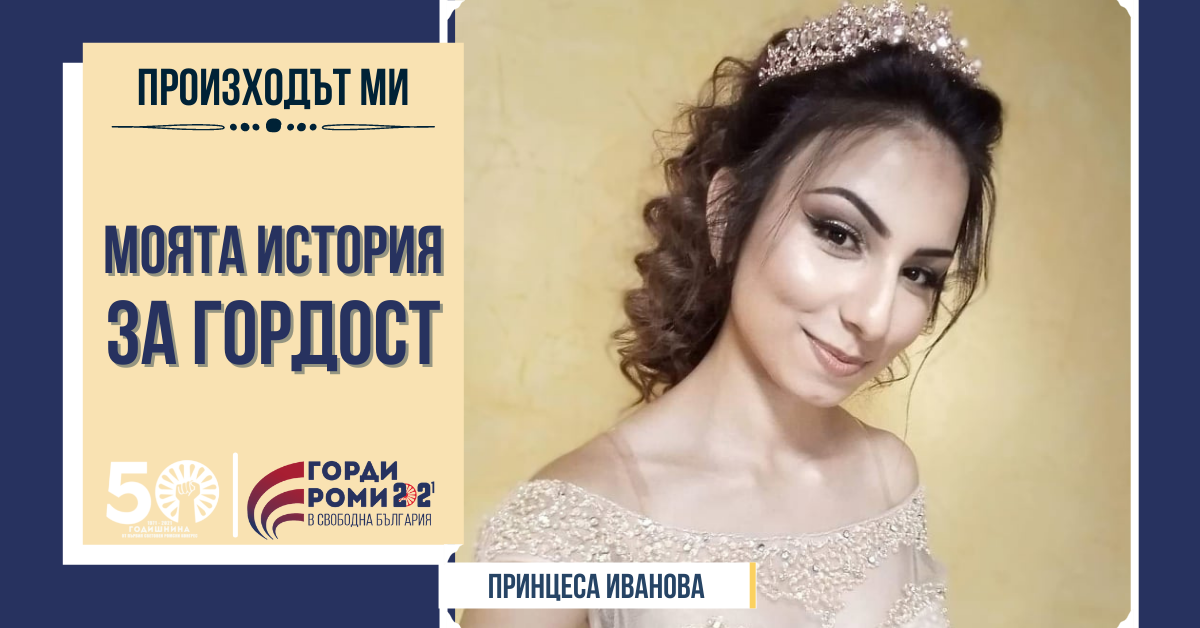The following is one of many stories of Roma pride published originally in Bulgarian on the website of civic organisation, Roma Standing Conference, partner of Proud Roma Free Europe.
My name is Princess – Princess Ivanova. I am 19 years old and I am from the north-western Bulgarian village of Dolni Tsibar. I come from a very close-knit family, and ever since I was a child, my parents have always been very supportive of my brother and me. They always encouraged a desire for knowledge and supported us in our every endeavour, whether participating in the Olympics or a voluntary initiative.
We grew up in a quiet, beautiful village on the banks of the Danube, away from the hectic city life. Our village of Dolni Tsibar is nicknamed ‘Roma Cambridge’, as more than 90% of the population is Roma, and there is a very high percentage of graduates among them.
What could be better for a child than to grow up in a place where they are accepted, understood, greeted with optimism and treated as equals? Until the age of 14-15, we did not face discrimination – we only heard the word on television. No one worried about their children, and everyone had the freedom and courage to be themselves.
The time must come, however, for the bird to leave its nest and learn to fly. I travelled to the big city, where life not only took on a faster pace but also revealed its harsh reality – a world that does not accept one’s differences.
I enrolled in a specialised high school and graduated in economics and management in the town of Lom – the only high school near our village with student transportation. The school is segregated, with the majority of attending students Roma. As such, for the four years I was there, I didn’t have to hide or be ashamed of my Roma origins.
While I didn’t face open racism during my time there, I couldn’t escape the feeling that something was missing and I wasn’t doing enough. I wasn’t experiencing the world. So, I decided to do something about it. I started volunteering, meeting new people, getting to know new places, and I gained a feeling of satisfaction and strength in my abilities. It spurred me to start organising various events and information campaigns that improve awareness of the conditions Roma face, but most of all – to wake up the Roma youth.
As I experienced these new environments, I felt people saw me differently and as an obstacle. Besides having an unusual name, I was often the only Roma woman in the room. I’d experience insults, ridicule, and ethnic slurs…
I have always been inspired by people with a clear sense of purpose who are committed to a cause and do everything they can to contribute to the well-being of their community. I am impressed by how young people subjected to racism learn to become successful and educated, working tirelessly to fulfil their dreams. And by those who become role models and help children, who, like me, have experienced feelings of insecurity and are afraid of the new. Such people can bring about change and challenge the present reality. I am proud to know such people, listen to, read and write about their achievements, their family’s pride, and how they shatter other people’s opinions.
What I am most proud of, however, is that, like them, I set a personal example and challenge stereotypes for a better future. I hate the word ‘integration,’ which sounds empty and overused. ‘Acceptance’, on the other hand, sounds completely different, and it sounds beautiful. But how do we expect others to accept us, given that we do not accept ourselves?
During the census in 2011, only 320,761 people from all over Bulgaria identified themselves as Roma! 320,761 Roma stand by their ethnic origin. Where is everyone else? Where are the big families of every Roma that we can count on? Where is the confidence in the traditions passed down by our ancestors? Where are our values and our Roma flag? Our blue and green flag features a wheel with 16 spokes, symbolising the eternal and earthly spiritual values of freedom and infinity, independence and progress.
Let us be more united. Let us acknowledge and remember our history and language because otherwise, we risk losing our identity. A nation that does not remember its roots is, like a tree, ready to break at any moment. Let us prevent this from happening. Our own and our ancestors’ struggle for independence would be in vain should we allow ourselves to be controlled and forgotten. Preserve your roots and identity so that with time, when the tree grows, you can enjoy the fruits of your labour!


